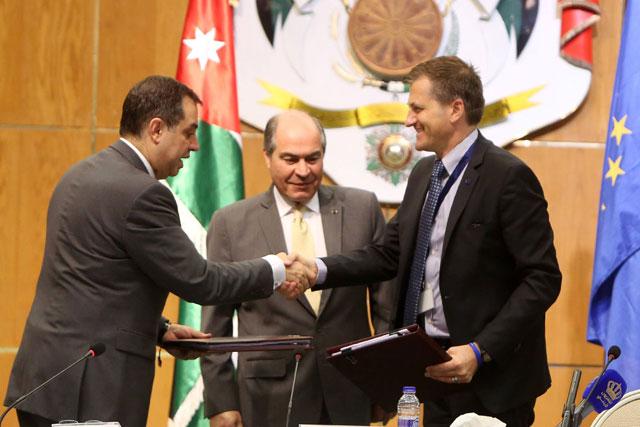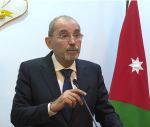You are here
Jordan-EU ‘relaxed’ rules of origin deal goes into effect for 10 years
By Khetam Malkawi - Jul 21,2016 - Last updated at Jul 21,2016

Prime Minister Hani Mulki attends the signing of a deal between Jordan and the EU on simplifying the rules of origin (Photo courtesy of EU mission)
AMMAN — Exports of Jordan-made products to Europe are expected to increase following a deal with the EU stipulating “relaxed” rules of origin.
The major provision that is expected to make a difference, according to officials, is that the Europeans have allowed made-in-Jordan products to include more than 70 per cent of production inputs from non-local materials.
At a press conference on Wednesday, Jordanian and European officials announced that the deal has entered into effect as of July 20 and will be valid until the end of 2026, adding that the agreement would contribute to boosting the country’s economy through promoting investments and creating more jobs for Jordanians.
The rules of origin will be applied to exports of Jordanian origin that are manufactured in designated development zones and industrial estates in Jordan including 50 harmonised system non-agricultural chapters.
Prime Minister Hani Mulki said the agreement is one of the London donor conference outputs and it would benefit the industrial sector in the Kingdom and provide Jordanian manufacturers with an opportunity to improve their products, standards and specifications.
“We have a long way to go,” Mulki said, underlying efforts needed in the coming months to work out implementation mechanisms and to campaign for the agreement among industrialists and investors.
Imad Fakhoury, minister of planning and international cooperation, said the adaptation of simplified rules of origin for Jordanian products came during the meeting of the 10th session of the Jordan-EU Partnership Committee that was held in Amman on Tuesday.
He explained that 18 industrial and developmental zones are included in this agreement and that Jordan is the first country in the region to conclude such an agreement with the EU.
Fakhoury explained that no less than 15 per cent of the manpower in any factory that will export to the EU within this agreement should be Syrians and this rate will be raised to 25 per cent in the third year of the agreement.
After reaching the goal agreed upon of providing 200,000 jobs for Syrian refugees, a number Jordan committed to in the London conference, the relaxed “rules of origin” will also be applied to other industries across the Kingdom.
The minister noted that simplified rules of origin are likely to attract local and foreign investments, open new markets and ensure a wider diversity of Jordanian exports. The new opportunity will compensate for the losses that the sector has incurred due to the closure of borders with turbulent neighbouring countries, especially Iraq and Syria.
In order to promote the agreement and acquaint potential investors with its benefits, Fakhoury said a conference for the targeted companies and businessmen will be organised either at the end of this year or early 2017.
For his part EU Ambassador to Jordan Andrea Matteo Fontana said the EU is ready to move on to the implementation of the decision to render it a fact on the ground, noting that this is a “major achievement” in EU efforts to enhance Jordan’s stability and resilience.
Meanwhile, responding to a question by The Jordan Times on the incentives that will be granted to industrialists to reduce production cost and be able to compete in the European market, the premier said this will be included with the tax incentives on exports, and the size of these incentives would be proportional to the volume of exports.
In addition, Fakhoury noted that Jordan is implementing several energy projects designed to reduce the cost of power.
Also on Wednesday, Jordan and the EU signed an agreement where the EU will provide Jordan with 90 million euros for renewable energy and energy efficiency projects.
The programme seeks to further boost economic development and competitiveness in Jordan, as well as promoting the application of green energy.
According to a statement distributed by the EU in Amman, the energy programme “will bring benefits to citizens with incentives in place to make buildings greener and more energy efficient”.
“Jordan’s water sector energy bill will be reduced by actions targeting main water pumping stations, and the farming sector will benefit as well,” the statement added. Also, a pilot project to generate energy from waste in Amman will help reduce energy bills for citizens.
“The EU is committed to develop sustainable energy sources, and to minimise the negative impact of conventional energy sources on climate change,” said Fontana. “The EU has invested over 145 million euros in green energy development in Jordan.”
He added: “We believe this programme is another important step to boost the green economy initiatives. It is equally important for creating jobs and fighting poverty. Further, our support addresses the increasing electricity demand generated by the Syrian refugee crisis.”
Related Articles
AMMAN – Minister of Planning and International Cooperation Imad Fakhoury, Minister of State for Media Affairs Mohammad Momani and EU A
AMMAN — Of nine companies that applied to the Ministry of Industry, Trade and Supply to export to Europe, six have been approved after compl
AMMAN — Total exports increased by 3.4 per cent during the first five months of this year but growth rate is still below expectations, the t
















